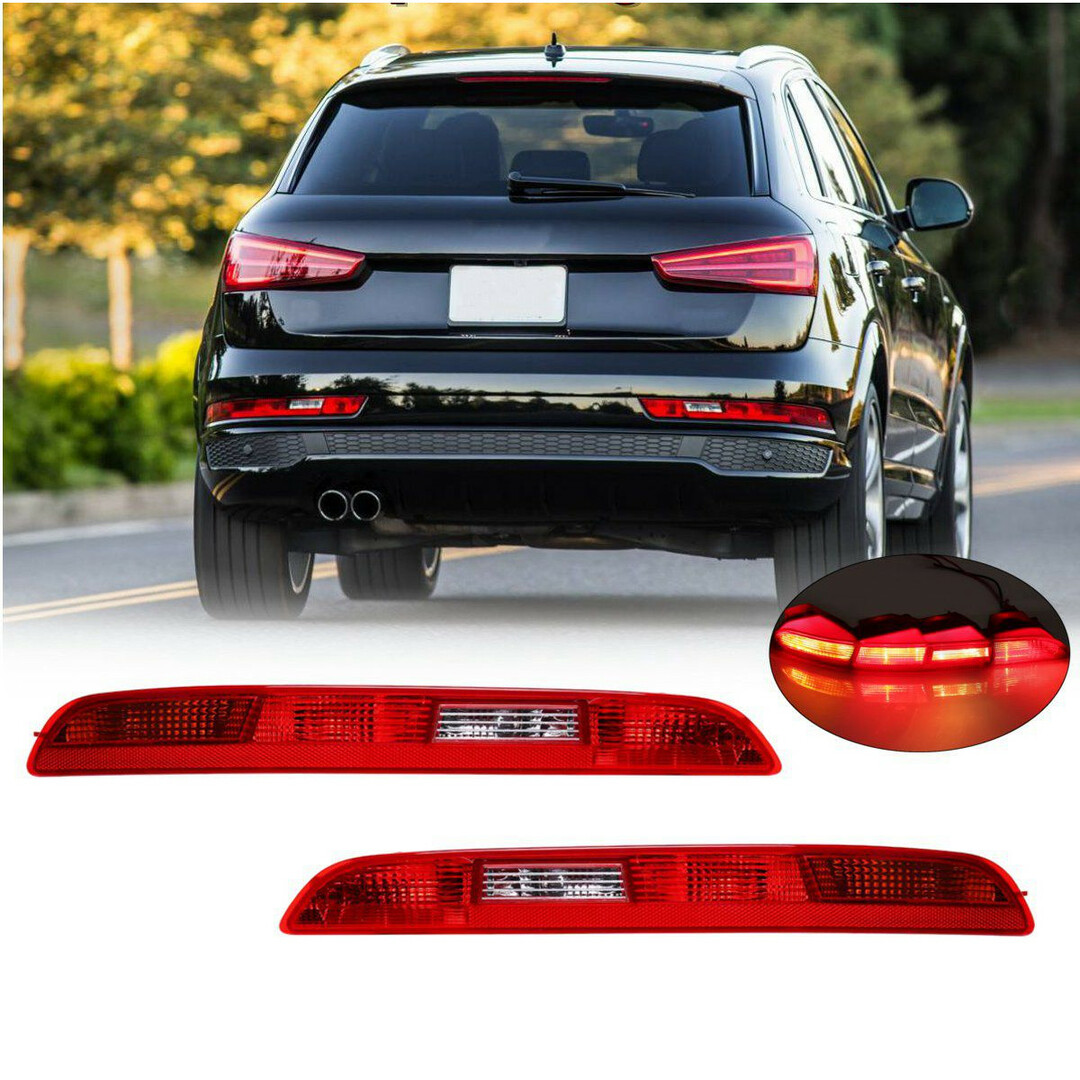Natural or liquefied gas is one of the most affordable and convenient fuels, so if you decide to get a gas boiler to heat your home, you have already made the right choice. Read about which device is right for you and which 4 gas boilers are worthy of the most close attention in our material.
CONTENT
- 1 What to look for when choosing a gas boiler
- 2 Top 4 best gas boilers
- 3 FAQ
What to look for when choosing a gas boiler
Principle of operation. The traditional option is a convection gas boiler, which heats water by simply burning the gas. It is a relatively inexpensive, reliable and easy-to-maintain design, the efficiency of which rarely exceeds 90-95%. Condensing boilers are more expensive and more complex: here not only energy is used to heat the coolant combustion gas, but also the one that is released during cooling and condensation of water vapor - one of the main products burning gas. The efficiency of such boilers due to this additional energy source can be 105-110%. That is, condensing units work more efficiently than convection units, allowing more heat to be extracted from the same amount of fuel.
Brand. A gas boiler is not a smartphone or a TV set. If you save on the manufacturer and take the Chinese devil, then you can get not just an easy disappointment from a poor-quality product, but quite serious poisoning, fire or flood - there is really lucky. Therefore, it is better to turn to the products of worthy and time-tested brands. German and Italian manufacturers of heating equipment are rightly considered the best all over the world: Baxi, Protherm, Vaillant, Buderus, Viessmann, Ariston, De Dietrich. There will be no problems with these companies either in terms of maintenance or in terms of warranty repairs: they all have services in Russia, so you won't have to wait for specialists or spare parts for a long time.
Heat exchanger material. The heat exchanger of a gas boiler can be made of various materials. Cast iron is the most common metal for this purpose. It is distinguished by high thermal inertia (it heats up for a long time, but also cools down for a long time, continuing to warm the water even after the boiler is turned off), resistance to corrosion and quite an acceptable price, however cast iron heat exchangers are larger and heavier than the others, besides cast iron - the metal is very fragile and requires careful treatment. Steel heat exchangers are thinner, which means they are smaller and lighter than cast iron ones. In addition, steel is a more flexible and accessible metal, not prone, unlike cast iron, to the appearance of microcracks. However, even stainless steel can rust - this is its main problem. Copper and aluminum are less common in heat exchangers: these non-ferrous metals are more expensive than cast iron or stainless steel, but where conduct heat better and perfectly resist corrosion, therefore they are usually used in the manufacture of boilers premium class.
Thermal power. Roughly speaking, this is the amount of heat that the boiler can produce. It is believed that one kilowatt of thermal power is enough to heat a ten square meter room. In principle, this simple formula really works, but only if the ceiling height does not exceed three meters, the room is normally insulated, and we are not talking about the regions of the Far North. One way or another, it is better to add about 20% more to the calculated power obtained - just in case. The fact is that a boiler that is too weak, which constantly works at the limit of its capabilities, will fail very quickly, so it is advisable to take the device with a small margin.
The number of contours. If you do not go into technical details that are superfluous for our purposes, then a single-circuit boiler is able to provide the owners with only heating. A double-circuit can also take over hot water supply, which is very convenient if you do not have an independent or indirect water heater.
Fastening method. As a rule, heavy and efficient gas boilers, which are designed to be placed in separate boiler rooms, have a floor mounting method. Wall-mounted gas boilers are lighter and less productive, but they take up much less space. The main thing is that even a small boiler must be mounted on a reliable (preferably load-bearing) wall, otherwise equipment failure will be inevitable.
Combustion chamber type. An open combustion chamber is a classic design that uses ambient air to burn gas. Boilers with such chambers are relatively inexpensive, capable of operating without electricity, but to comply safety measures and just for normal operation they need separate boiler rooms and chimneys six to seven meters height. Closed combustion chambers require forced ventilation, they are more expensive, but also more compact than analogues. In addition, a boiler with a closed combustion chamber does not require a separate room and a large chimney - a coaxial pipe-in-pipe system is sufficient, which is led out into the street through a hole in the wall.
Energy independence. Modern boilers are often equipped with functionality that does not work without electricity: electronic control, auto-ignition, forced ventilation, various control systems for work, programming, auto-diagnostics and other options. On the one hand, they greatly simplify the work with the equipment. On the other hand, a simple non-volatile boiler with mechanical control is usually much cheaper, it is ready to work even where there is no electricity.
Top 4 best gas boilers
Best Wall Hung Gas Boiler
1. BAXI ECO-4s 24F 24 kW
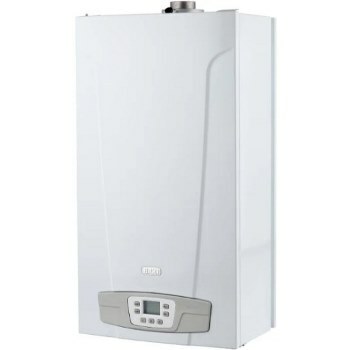
Classic wall-mounted convection gas boiler. The double-circuit design allows you to provide the house with not only heat, but also hot water. The maximum thermal power is 24 kW, which is enough to heat a room up to 240 square meters. The closed combustion chamber does not require the organization of a separate boiler room with a chimney. The primary heat exchanger is made of copper, the secondary one is made of stainless steel. Connection of external control and underfloor heating is provided, thermometer, pressure gauge and water filter are built-in. The price of the issue is a rather modest 33,500 rubles.
Price: ₽ 33 485
BAXI ECO-4s 24F 24 kW
Best single-circuit gas boiler
2. Buderus Logamax U052-24 24 kW
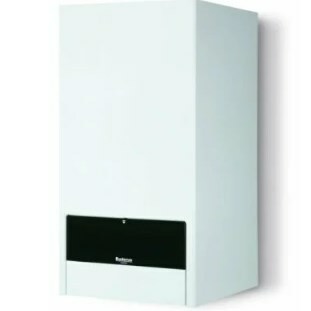
Prices for this single-circuit gas boiler start at 53,000 rubles. For this amount, we are offered a traditional convection-type unit with a closed combustion chamber, a maximum thermal power of 24 kilowatts and an efficiency of 90.03%. The primary heat exchanger is made of copper. Protection against frost, overheating and pump blocking is provided. In addition, gas control, a safety valve and an air vent are responsible for safety. There are built-in indication of inclusion, auto-ignition, thermometer and pressure gauge.
Price: ₽ 53 300
Buderus Logamax U052-24 24 kW
Best double-circuit gas boiler
3. Viessmann Vitopend 100-W A1JB011 29.9 kW
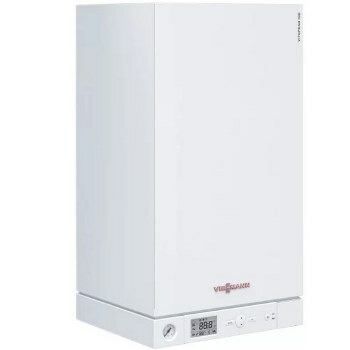
Another convection gas boiler - this time a double-circuit one. The device costs 20% cheaper than the previous one (they ask for it in the region of 46,500 rubles), but it can do just as much, and even more. Let's say the thermal power of this device is a solid 29.9 kW, and the efficiency is 91%. This boiler is generally equipped with the latest technology: there is a closed combustion chamber, and electronic control, and auto diagnostics, and a programmer, and auto ignition. Safety is monitored by protection against freezing, pump blocking and overheating. A built-in thermometer and a pressure gauge are provided, there is the possibility of connecting an external control.
Price: ₽ 46 485
Viessmann Vitopend 100-W A1JB011 29.9 kW
Best floor standing gas boiler
4. Protherm Wolf 16 KSO 16 kW
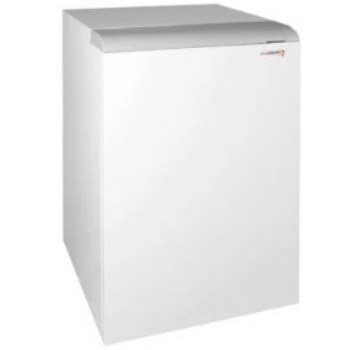
The price of this small floor-standing gas boiler is less than 20,500 rubles, but it pays off every ruble spent on it. The unit is made according to the classical scheme: a convection design with an open combustion chamber and a steel heat exchanger. Thermal power of 16 kW is enough to heat a private house with an area of up to 160 square meters. Mechanical control and the absence of additional functionality make the boiler completely non-volatile. Overheat protection and gas control are provided, as well as built-in thermometer and pressure gauge. Everything you need and nothing more.
Price: ₽ 20 575
Protherm Wolf 16 KSO 16 kW
FAQ
Why does the gas boiler go out?
Most likely, the fire is extinguished by protective automatics. The reason may be low chimney draft or drop in gas pressure. It is better not to play with fire here, but to call a specialist who will figure everything out.
Why does the gas boiler often turn on and off?
There may be a sea of reasons. For example, an overly powerful boiler can behave this way in a confined space, in addition, there may be problems with the circulation pump or thermostat. In any case, only professional diagnostics can give an answer.


